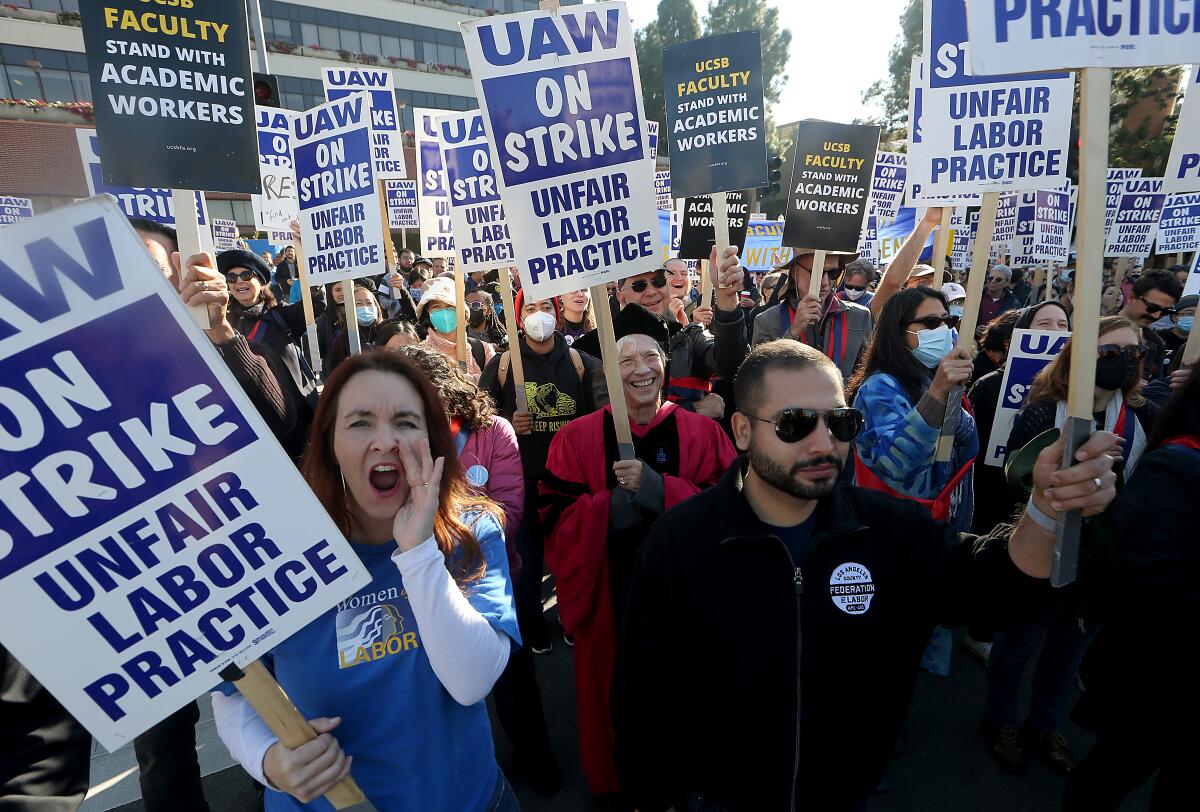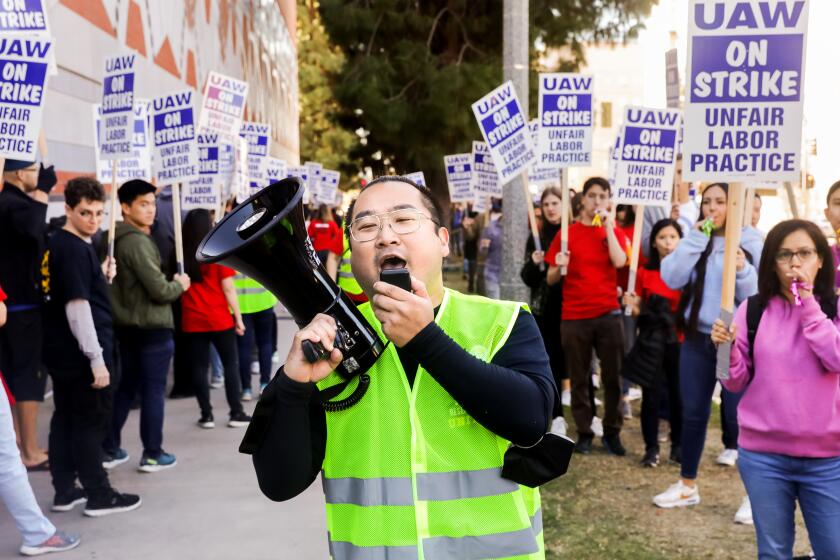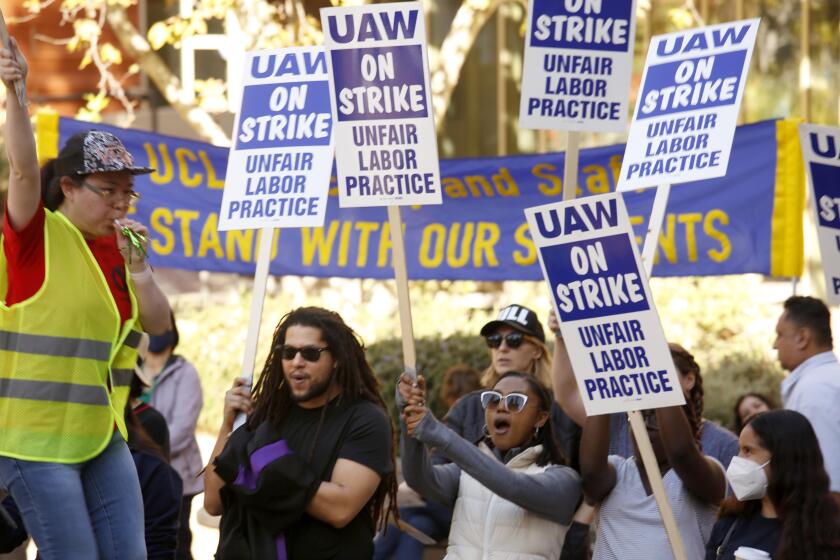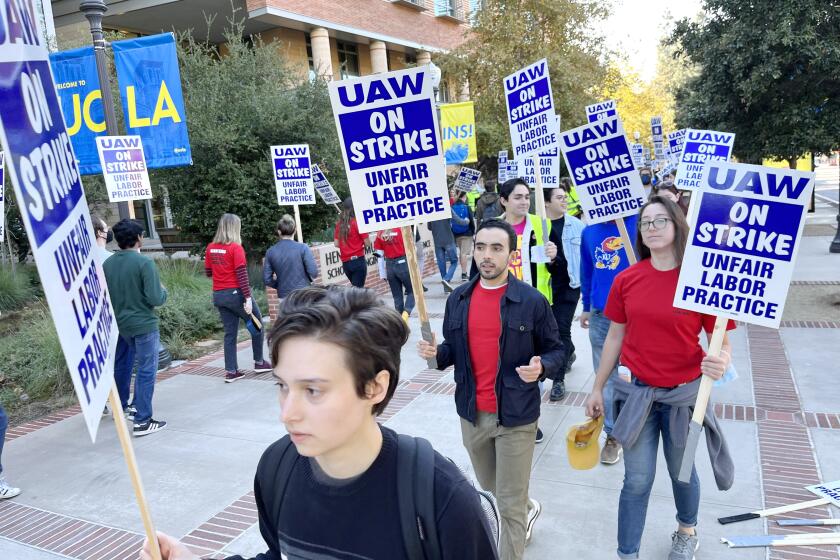‘Enough is enough!’ Striking UC workers say they are weary but won’t give up

- Share via
During the fifth week of the historic strike by UC academic workers, hundreds of demonstrators converged on the UCLA campus, shouting for better pay and benefits, and forcing the delay of a regent’s meeting, as picketers said they were determined to show that winter break will not erode their momentum.
The striking student workers rallied outside UCLA’s Luskin Center, where the UC Regents were scheduled to meet Wednesday morning. They shouted “Shut it down!” and jammed along with Tom Morello, former guitarist with Rage Against the Machine, who led the assembly in songs that included lines like, “Sí, se puede!” and “Hold the line!”
It was the latest action in the protracted standoff over wages and other issues between UC leaders and 36,000 striking academic student workers as the 10-campus system embarked on winter break and stalled negotiations spurred the union to agree with UC’s request to bring in an independent mediator.
Standing on the flatbed of a truck, Rafael Jaime, president of UAW 2865, a union that represents 19,000 graduate teaching assistants, researchers and tutors, spoke about what’s at stake.
“We right now are in the midst of one of the most important struggles for the future of public higher education,” he said. “Enough is enough! … We have the potential to chart a new path for UC that serves workers, students and the people of California.”
Negotiations entered a new phase this week when Darrell Steinberg, the mayor of Sacramento and former leader of the state Senate, stepped in to mediate the labor dispute.
Steinberg helped broker an agreement earlier this year between Kaiser Permanente and roughly 2,000 striking mental-health clinicians and also was credited for a settlement with labor union leaders needed to advance the multimillion dollar Aggie Square project on UC Davis’ campus.
If the sides do not reach an agreement with Steinberg’s help, they will return to negotiations without a mediator or file for impasse and the Public Employment Relations Board would intervene.
About 48,000 unionized academic workers across the University of California’s 10 campuses walked off the job, calling for better pay and benefits.
Last Friday, union leaders representing postdoctoral scholars and academic researchers — about 12,000 employees who had also been on strike — approved a new contract with the university. The new agreement included raises that moved the minimum annual pay for these full-time employees from about $55,000 to $70,000 or higher — including a $12,000 raise by next October.
The contract also required these employees to return to work this week.
About 36,000 academic employees, like Adu Vengal, a third-year math doctoral student at UC San Diego, remain on strike.
The workers who remain on strike are all students — researchers and teaching assistants, the latter of who who grade papers, run discussion classes and proctor exams. They reaffirmed their resolve to continue the walkout, even as some admit the physical and mental toll of the strike the picket line.
“I’m both tired and energized,” said Anny Viloria Winnett, a second-year doctoral student in community health sciences at UCLA.
Over the last month, Viloria Winnett said she injured her IT band as she marched on campus, and lost her voice from shouting into a bullhorn. On rainy days, she has held an umbrella in one hand and her asthma inhaler in the other.
But she said she is also heartened by the camaraderie she’s built with colleagues through conversations on the picket line.
The strike of 48,000 University of California workers may have long-lasting consequences to the system’s teaching and research excellence, some fear.
Viloria Winnett, a student researcher who studies the human and fiscal cost of incarceration in Los Angeles County, said she makes about $35,000 a year through a combination of fellowship money and her student researcher job.
She said she has not been able to keep up with medical costs, including paying for inhalers and a $3,000 surgery earlier this year.
“I just didn’t have that cash in savings,” she said. “You add up all the medication after that, [it’s] easily $5,000 a year on stuff that has to come on a credit card because I have no other way to pay for it.”
Gloria Bartolo, a second-year doctoral student studying molecular biology at UCLA, said the time away from research while picketing is weighing on her. But she is holding steadfast to the strike’s goals.
“This isn’t the end game, to strike forever. We want this to end,” she said. “But we want this to end on a fair contract.”
The union has demanded significant pay increases so employees can afford housing in the high-cost areas where most UC campuses are located, calling the system’s current wages and benefits “unlivable” and detrimental to their mental health and capacity for teaching and conducting research.
While UC has made offers that include salary increases, the raises have been far short of the demands from union leaders. However, the two sides have agreed tentatively to new anti-bullying protections, expanded paid parental leave and some new commuting support.
UC officials have repeatedly said it is making proposals that are “fair, reasonable and responsive to the union’s priorities.” Officials have also noted student workers who are employed more than 25% of the time by UC also have their full tuition covered, as well as student service fees and healthcare premiums.
Bartolo makes $37,500 a year as a graduate student researcher, which she said is on the higher end of pay for her position.
Tying workers’ pay to their housing costs could have ‘overwhelming financial impacts,’ for UC. a system provost warns amid strike.
To get by financially, Bartolo said she receives food stamps. She and other residents who live in her university-owned apartment building also used to run an informal food bank in the complex, where they traveled to food pantries on a weekly basis to gather produce and canned goods for one another.
“I grew up in poverty. I grew up qualifying for food stamps,” said Bartolo, who holds bachelor’s and master’s degrees. “It’s upsetting — I feel like I should have moved up.”
Standing among the crowd of striking workers outside the regents meeting, Morgaine Mandigo-Stoba, a third-year doctoral student in the physics department at UCLA, said she was invigorated by the demonstration — and by what she feels are insufficient contract proposals from UC.
“We are not ready to go home,” she said. “Their proposals — their refusal to give us a serious offer — has definitely lit a fire under people.”
Jackie Ku, a doctoral student who represents UC Irvine on the UAW 2865 bargaining team, said he is prepared to strike for as long as it takes to secure a fair contract.
“If the UC is hoping to exhaust us, if the UC is hoping to hold out to see if this is going to fade, it’s not going to,” he said. “As tired as we may be … what’s more tiring is being unable to pay the rent.”
Before the regents meeting, a group of picketers delayed the meeting for hours by refusing to leave the room, said UC spokesperson Ryan King. About 15 were cited by university police and were peacefully escorted from the room, he said. Vengal said he was among a group who were handcuffed and cited for trespassing and unlawful assembly.
As the quarter wound down during finals last week at UC Irvine, the number of picketers on campus thinned slightly. Still, some striking workers said conversations and debates about how the union should move forward have become more substantive.
“It’s exhausting, but if we don’t do it, who else will?” said Tia Wilson, a PhD candidate in material science and engineering at UC Irvine. “I can’t live with the crappy contract, so I’m in it for the long haul.”
More to Read
Sign up for Essential California
The most important California stories and recommendations in your inbox every morning.
You may occasionally receive promotional content from the Los Angeles Times.


















